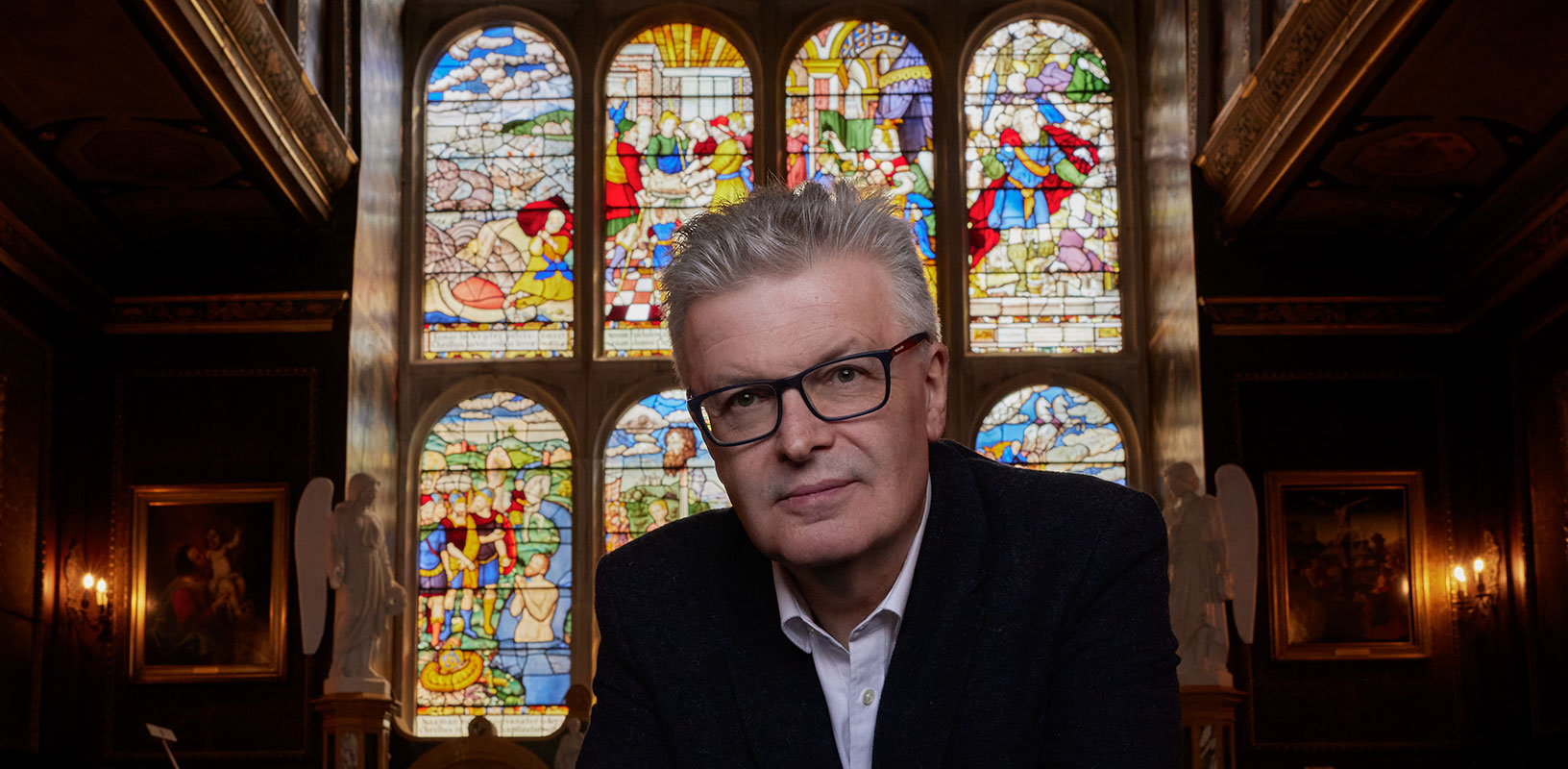James MacMillan: premieres of two major choral-orchestral works

Coming months bring the European premiere of James MacMillan’s light-filled Fiat Lux in London and first performances of his new Robert Burns setting Composed in August in Scotland and Estonia.
Two major James MacMillan works combining choral voices and orchestra are introduced to European audiences in March and April. Fiat Lux, calling up a cathedral of light, is performed by the BBC Symphony Orchestra and Chorus at the Barbican in London on 15 March, and his new version of Robert Burns’s song Composed in August is premiered by the Scottish Chamber Orchestra and Chorus on 21 March. A further performance of the Burns setting is given by the Estonian Philharmonic Chamber Choir on 13 April as part of a focus on MacMillan’s music in Tallinn this season.
James MacMillan is on the rostrum as conductor for the European premiere of Fiat Lux with BBC forces at the Barbican in London on 15 March, joined by soloists Mary Bevan and Roderick Williams, with the performance being broadcast on BBC Radio 3. The 30-minute score for soprano, baritone, mixed chorus, organ and orchestra was composed in 2020 and premiered after pandemic-related delays in June 2023 by the Pacific Chorale and Pacific Symphony in California conducted by Carl St. Clair.
Fiat Lux was commissioned to mark the reconsecration of Christ Cathedral Garden Grove in Orange County, California, and the poetry and soundworld of MacMillan’s work reflect the immensity of light and space in that glistening architectural structure. Combining Biblical texts in Latin with a poem by former California poet laureate Dana Gioia, Fiat Lux opens in the darkness before the creation of the universe, captures the divine spark of the title ‘Let there be Light’ spreading upwards and outwards, moves through a Litany of Light and celebrations for the Light of the World, to embrace a final chorale of consecration. This journey, both spiritual and human, is painted with MacMillan’s masterly range of instrumental colour, from delicate chamber groupings to full orchestral glory. The vocal writing, rooted in plainchant, is transformed into ecstatic song for soloists and choir, culminating in the exuberant closing Amen.
“The text is by the California poet Dana Gioia, who seamlessly localizes paradise as a place to be preserved. Through the verses, Gioia’s gaze deflects the light of our ‘August sky’ and ‘human eye’ to a ‘crystal spire / built in a land / of quake and fire’… Chant grows into glorious song… [the soloists] shared in a thrilling exuberance that won’t let go.”
Los Angeles Times
The world premiere of MacMillan’s Composed in August is given at the Usher Hall in Edinburgh on 21 March, followed by a performance the next day at City Halls in Glasgow. The Scottish Chamber Orchestra and Chorus perform the new Robert Burns setting conducted by Maxim Emelyanychev in celebration of the orchestra’s 50th anniversary. The 20-minute score was commissioned by the Scottish Chamber Orchestra jointly with the Estonian Philharmonic Chamber Choir who perform Composed in August on 13 April with the Tallinn Chamber Orchestra under conductor Tõnu Kaljuste.
James MacMillan describes how “Composed in August is a song-cum-poem by Robert Burns, better known today by its opening line Now Westlin Winds. It is one of the Scottish poet’s earliest songs although he revised it several times. The first version was in more standard English, written around 1775 when Burns was only 16. It is a love song coloured by a sense of autumn. In fact, the poet’s love of nature is contrasted and interwoven with his love of a young woman.”
Following the Scottish performances of Composed in August, James MacMillan features in the Scottish Chamber Orchestra’s digital season with a streamed online performance of Tuireadh, filmed at the Leith Theatre and available to view 28 March to 27 April. Composed in 1991, Tuireadh (Gaelic for ‘lament’) is MacMillan’s moving elegy for the victims of the Piper Alpha oil rig disaster, heard here in its version for clarinet and string orchestra.
As well as the Estonian premiere of Composed in August, the all-MacMillan programme at the Estonia Concert Hall in Tallinn on 13 April also includes the dance imbued Piano Concerto No.2 with soloist Sten Heinoja, Í (A Meditation on Iona) depicting the spiritually charged Scottish island, and the Lenten choral work with solo violin Domine non secundum peccata nostra. The ongoing focus on MacMillan’s music in Tallinn this season follows the Estonian premieres of his opera Clemency last August and of Symphony No.5: ‘Le grand Inconnu’ in November.
> Visit the Scottish Chamber Orchestra website
> Visit the Estonian Concerts website
January was a month rich with MacMillan performances including the world premiere of his latest work Ordo Virtutum, setting texts by Hildegard of Bingen for soprano, choir and percussion. Soprano Yeree Suh and percussionist Michael Weilacher joined the MDR Radio Choir under Philipp Ahmann for the performance at the Peterskirche in Leipzig, celebrating the choir’s centenary, followed by a radio broadcast on MDR Klassik and MDR Kultur. MacMillan’s recent orchestral work Her tears fell with the dews at even, a poetic snapshot drawn from an early poem by Alfred Lord Tennyson, received its UK premiere in Cardiff with the BBC National Orchestra of Wales conducted by Jordan de Souza. The Brentano Quartet travelled to the Netherlands to give the European premiere of Heart Speaks to Heart at the Muziekgebouw aan 't IJ in Amsterdam as part of the String Quartet Biennale, following their first performance of the new quintet with violist Hsin-Yun Huang in the US last September.
> Further information on Work: Fiat Lux
Photo: James Bellorini
